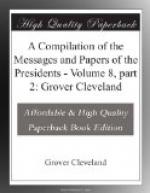DANL. WEBSTER.
ANNOUNCEMENT TO THE ARMY.
[From official records in the War Department.]
DEPARTMENT OF WAR,
Washington April 5, 1841.
It is with feelings of the deepest sorrow that the Secretary of War announces to the Army the death of the President of the United States. William Henry Harrison is no more. His long and faithful services in many subordinate but important stations, his recent elevation to the highest in honor and power, and the brief term allotted to him in the enjoyment of it are circumstances of themselves which must awaken the liveliest sympathy in every bosom. But these are personal considerations; the dispensation is heaviest and most afflicting on public grounds. This great calamity has befallen the country at a period of general anxiety for its present, and some apprehension for its future, condition—at a time when it is most desirable that all its high offices should be filled and all its high trusts administered in harmony, wisdom, and vigor. The generosity of character of the deceased, the conspicuous honesty of his principles and purposes, together with the skill and firmness with which he maintained them in all situations, had won for him the affection and confidence of his countrymen; but at the moment when by their voice he was raised to a station in the discharge of the powers and duties of which the most beneficent results might justly have been anticipated from his great experience, his sound judgment, the high estimation in which he was held by the people, and his unquestioned devotion to the Constitution and to the Union, it has pleased an all-wise but mysterious Providence to remove him suddenly from that and every other earthly employment.
While the officers and soldiers of the Army share in the general grief which these considerations so naturally and irresistibly inspire, they will doubtless be penetrated with increased sensibility and feel a deeper concern in testifying in the manner appropriate to them the full measure of a nation’s gratitude for the eminent services of the departed patriot and in rendering just and adequate honors to his memory because he was himself a soldier, and an approved one, receiving his earliest lessons in a camp, and, when in riper years called to the command of armies, illustrating the profession of arms by his personal qualities and contributing largely by his successes to the stock of his country’s glory.
It is to be regretted that the suddenness of the emergency has made it necessary to announce this sad event in the absence of the Vice-President from the seat of Government; but the greatest confidence is felt that he will cordially approve the sentiments expressed, and that he will in due time give directions for such further marks of respect not prescribed by the existing regulations of the Army as may be demanded by the occasion.




